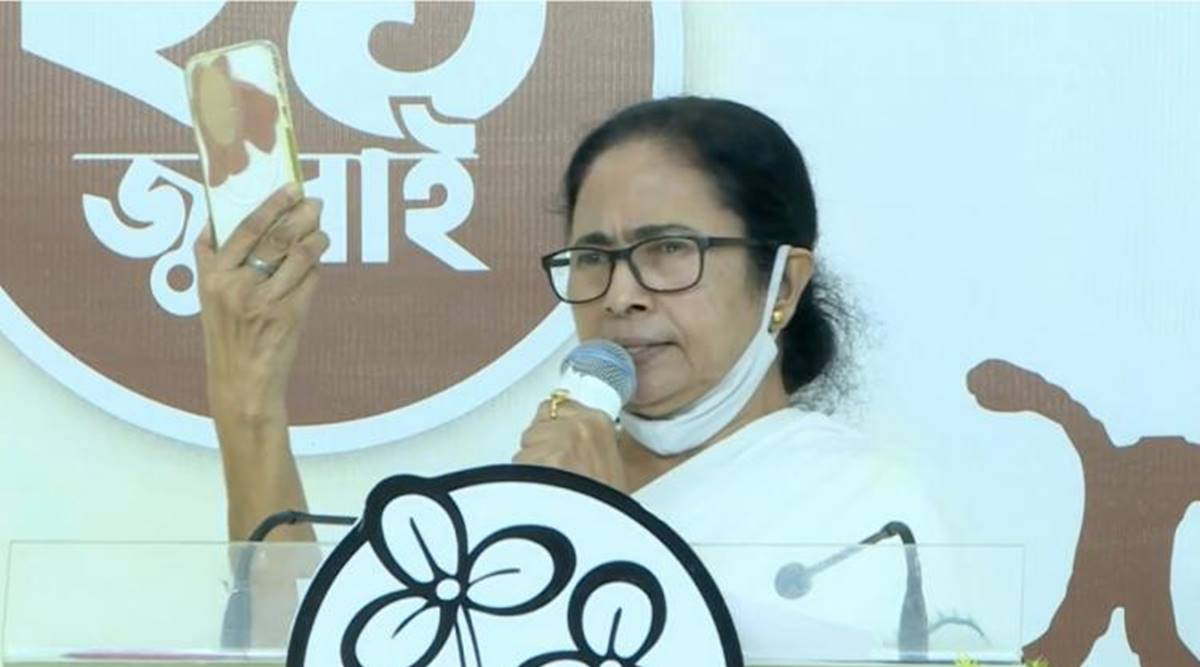Making an aggressive new move in her ongoing tussle with the Centre, West Bengal Chief Minister Mamata Banerjee on Monday announced a commission of inquiry into the alleged surveillance of phones using the Pegasus spyware developed by the Israeli cyber-intelligence company NSO Group.
Retired Supreme Court judge Justice Madan B Lokur, and former Chief Justice of Calcutta High Court, Justice (retd) Jyotirmay Bhattacharya, have been appointed as members of the commission.

Banerjee made the announcement shortly before she left for Delhi on a three-day visit during which she will meet several leaders of the Opposition to explore ways to build a front against the BJP before the Lok Sabha elections of 2024.
After a special meeting of the West Bengal Cabinet on Monday, the Chief Minister said: “The Cabinet has approved the appointment of a commission of inquiry consisting of the Hon’ble Justice M B Lokur, retired Justice of the Supreme Court, and the Hon’ble Justice Jyotirmay Bhattacharya, retired Chief Justice of Calcutta High Court, in exercise of the power under Section 3 of The Commissions of Inquiry Act, 1952, in the matter of the widely reported illegal hacking, monitoring, putting under surveillance, tracking, and recording of mobile phones of various persons in West Bengal.”
“They (members of the commission) will look into who all are involved in this hacking, and how they are doing this illegal activity. And also how they are keeping others mum,” Banerjee told a press conference in Kolkata.
“We thought the central government will take steps on this, and will form a neutral investigation team. However, they did not do so. Then we decided to set up a commission of inquiry ourselves,” she said.
Under The Commissions of Inquiry Act, both the Centre and states can institute a probe. Under Section 3(1)(a) of the Act, once the Centre has appointed a commission, a state cannot, “except with the approval of the Central Government, appoint another Commission to inquire into the same matter for so long as the Commission appointed by the Central Government is functioning”.
Story continues below this ad
Section 3(1)(b) of the Act, however, says that once a state government has appointed a commission, “the Central Government shall not appoint another Commission to inquire into the same matter for so long as the Commission appointed by the State Government is functioning, unless the Central Government is of opinion that the scope of the inquiry should be extended to two or more States”.
The Centre has not so far responded to persistent demands by the opposition for an inquiry into the revelations of the global media investigation titled the Pegasus Project, which has identified a large number of politicians, businesspersons, officials, and journalists whose phones were possibly infiltrated by the spyware.
The Centre has also refused to either confirm or deny in unequivocal terms whether such snooping had in fact, taken place and, if so, by whom. It has instead alleged that the global investigation has been timed to undermine India’s democracy and disrupt the Monsoon Session of Parliament.
Among the names revealed by the investigation by the French nonprofit Forbidden Stories and the global human rights organisation Amnesty International along with 16 international media partners including The Wire in India, are those of Trinamool Congress MP and the Chief Minister’s nephew Abhishek Banerjee, and her adviser for the recent state Assembly elections, Prashant Kishor.
Story continues below this ad
“To probe hacking and how it is being done… I hope this small step will wake up others. We want the Justices to start as soon as possible. Many people from Bengal have been tapped,” Banerjee said.
According to the notification issued by the West Bengal government, the commission’s terms of reference include:
* To enquire into whether any incidences of reported interception have occurred;
* To enquire into the State and non-State actors who were involved in such reported interception;
Story continues below this ad
* To enquire into mechanism and/or spyware and/or malware that were being used to effectuate such reported Interception.”
The commission is also expected to “enquire into whether State/non-State actors can, without any express legal provision and/or judicial oversight, carry out the reported interception”.
The commission has been given six months to submit its report.









